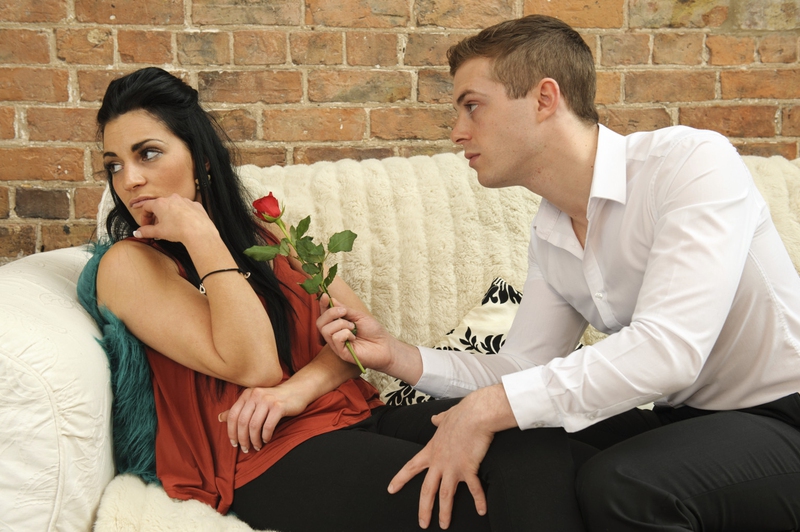How to Talk to Anyone (Junior Talker #5) by DeYtH Banger (you can read anyone TXT) 📖

- Author: DeYtH Banger
Book online «How to Talk to Anyone (Junior Talker #5) by DeYtH Banger (you can read anyone TXT) 📖». Author DeYtH Banger
 Signs of a Coward Guy
Signs of a Coward Guy
If you believe you’re in a relationship with a coward, or simply want to steer clear of such people, then don’t worry. There are clear signs that can help you make up your mind!1He’s almost always dishonest
1. This is the first sign that you are dealing with a coward. Such a man will never be honest about anything, especially when confronted. He tends to dance around the truth and go round in circles other than being straight forward and honest. He will always try to change the subject when you bring up questions that make him uncomfortable.
 2. He puts up a false bravado
2. He puts up a false bravado
This is one of those signs of a coward guy that can be difficult to ascertain in the beginning, but become clearer with time. A coward will always pretend to be something he is not and more often than not will always brag about how strong and macho he can be. In all likelihood, such a guy will run for the hills in time of danger, leaving you wondering how fast he can run away from danger, rather than defend himself and those around him.
3. He is constantly apologizing
Sometimes, a coward takes the exact opposite approach of putting up a false bravado. Such a guy apologizes constantly and consistently even for the smallest mistake. Apologizing is a sign of humility but one can only do it so much. For instance, he will quickly apologize when someone steps on him accidentally instead of the other way round. There are situations where you need a man to step up and not constantly apologize like a loser. You obviously do not want to be in a relationship with a man who has no spine and cannot stand up for himself, let alone stand up for you.

4. He can sometimes be… delusional
Looking for signs of a coward guy? Then take note of this one. A coward lives in his own world, where reality is merely a passing phenomenon. He rationalizes other people’s mistakes towards him and is never in touch with reality. He takes in information and processes it in a way that only makes sense to him.

5. His every move is calculated
A coward is always self-conscious of all his actions and second guesses everything he does. Besides, every single move he makes is calculated and he constantly worries about who is watching him and what others think about his actions. For example, he will always dress in a way that makes him feel accepted and do everything in regard of the standard that people place no him. Such a man will never speak his mind or express himself in fear of how he will be judged by others.

6. Shy away from confrontation
This is one of the sure signs of a coward guy for a coward will never be the recipient of confrontation. Instead, he will do everything in his power to shy away from it even when he rightfully deserves it. Confronting someone who has wronged you is never easy but it relives you of emotional stress that comes with it. A man who chooses to bottle his emotions when wronged and runs away from confrontation displays a cowardly trait. What's more, bottling up emotions can be dangerous and even causes harm to yourself and others.

7. He cannot face his fears
Different people go through different traumatizing experiences in their lives. Although it is easy for some to get through these experiences, learn from their mistakes and move on, others take a longer time. Some, however, do not really move on and overcome the pain and trauma they went through. They sadly end up being cowards and cannot be around anything or anyone who reminds them of their past trauma. Although coward might be a word harshly used for such people, it is a known reality.
 8. He always plays safe
8. He always plays safe
This is one of the easiest signs of a coward guy to notice. Everybody knows that the greatest minds in the world have achieved a lot by taking risks and believing in themselves. A coward is a person who will always choose to play safe in any situation and is never bold enough to take any risk. Always wanting to do things the right way and by the book is a cowardly move. There’s only so long that one can play safe, you know.

Why Do People Stay in Abusive Relationships?
The answer is more complicated than you think.
During one of my breaks last week, I received an email from a colleague. The subject: "Another Know Nothing." Included was a link to the evolving story about New Hampshire state legislator Mark Warden's recent comments. I scanned down the page, and just below the header, next to Warden's innocently beaming face, I found his offending remarks: "Some people could make the argument that a lot of people like being in abusive relationships. It's a love-hate relationship. It's very, very common for people to stick around with somebody they love who also abuses him or her."
Warden was attending a state HouseCriminal Justice and Public Safety Committee meeting on legislation designed to reduce a charge of simple assault from a misdemeanor to a violation. Apparently he'd argued that victims can leave at any time, so more legislation isn't the answer. Later, he trotted out an explanation for his gaffe that's become popular among many politicians: his words had been taken out of context.
He's right in one respect: More legislation isn't enough to end domestic violence. Many domestic violence specialists agree that the problem is much broader, requiring widespread cultural, institutional, and psychological education and intervention (the Battered Women's Movement of the '70s is the first instance of just such a concerted, grassroots effort). But you won't find a single expert familiar with domestic violence who agrees that victims like being in an abusive relationship.
It would be easy, then, to dismiss Warden's remarks as those of someone shockingly ill-informed -- the insipid ramblings of an idiot. We could call him vapid or simple-minded or hopelessly out of touch. And doing all that might be gratifying. But he's hardly an isolated example.

In pondering this post, my mind flashed at once to a client I saw decades ago: a tall, brooding woman with firmly-sculpted arms -- the result of years of working out -- whose rolled-up sleeves revealed several fading bruises on her forearms, courtesy of her boyfriend. "I love him," she told me resolutely. "I know he can do better."
She was an impressive, thoughtful, strong woman -- not at all the type I expected to be a target of domestic violence. Yet she'd become trapped in a dangerous relationship, a prisoner of her own hope, waiting for the day the assaults would end. Her friends' words to her? If you don't stay, he can't hurt you. She seemed so powerful that surely she had the strength to leave.
The reality is the abused, like my client, aren't always fragile or powerless. They come from all walks of life -- rich, poor, strong, weak -- and from both genders, female and male. My client's friends loved and cared about her, that much was clear. But here they were, guilty of the same thinking as Warden. "You must be choosing to stay with an abuser for some reason," they told her. They couldn't reconcile their vision of her as strong and powerful with her apparent powerlessness to leave. So they blamed her for the choice.
But let's be honest, Warden's comments -- and those of my client's friends -- reflect our shared confusion and impatience as a society. It doesn't matter whether we're conservatives or liberals, Republicans or Democrats, ignorant or well-informed, we all have an instant negative reaction when we see people return to or stay in abusive relationships. We think it's all so clear, even if we're not guilty, like Warden, of saying it out loud. Just leave!
But the truth is that we have yet, as a society, to come to terms with the dynamics of abuse. Here's the reality.
Take a look at the chilling photo essay by photographer Sara Naomi Lewkowicz (it appeared nearby the story on Warden). In serial images, she captures a relationship as it escalates into violence. The danger grows, subtly, insidiously, through each successive image, but you'll also notice, if you look closely, moments of enormous tenderness and vulnerability between the man and woman. Those snapshots are poignant reminders of what abuse victims hold onto in staying with their abuser. They don't stay for the pain. Their desperate, often palpable hope, if you sit in the room with them, is that the abuse will go away. And they tend to block out all evidence to the contrary. In point of fact, they stay for love. Many abuse survivors cling to the positive traits in their partners -- like being affectionate and reliable. In one study, more than half of the abuse survivors saw their partners as "highly dependable."
Many others suffer from post-traumatic stress syndrome, one symptom of which is dissociation, which often creates such profound detachment from the reality of the abuse that sufferers scarcely remember being hurt at all. Dissociating victims can't leave the abuse because they aren't psychologically present enough to recall the pain of what happened.
There are other, well-documented hurdles to victims leaving their abusive partner. For one, the abused are often cut off from friends and financial supports. For another, they're often afraid to leave, and with good reason (more than 70 percent of domestic violence injuries and murders happen after the victim has left). One can't escape a dangerous situation if it feels safer to stay. But perhaps one of the most formidable and dangerous obstacles abuse victims face is their own searing guilt and shame; they're incredibly adept at blaming themselves for the abuse (see here for more about the dynamics of self-blame).
Which brings us back to Warden -- and anyone who's ever wondered what an abuse victim derives from staying. It's giving into this very thought -- they must like this -- that creates one more barrier to the abused being able to leave. It makes the world simpler, no doubt, for us to indulge this theory. We feel safer. "That couldn't happen to me," we can say. "I'd never put up with it." But the research proves anyone can end up abused. And blaming the victims in this way is a huge part of the problem. It reinforces their shame.
Victim-blaming is dangerous enough that, in summarizing the conclusions of hundreds of studies on domestic violence, the U.S. Department of Health and Human Services cites, as a barrier to ending domestic violence, the brute fact that "peers, family members, and others in the community (e.g., coworkers, social service-providers, police, or clergy) minimize or ignore the abuse and fail to provide consequences." Instead of condemning the abuse, people around the victims often simply admonish them with "What do you expect if you choose to stay?"
While Warden's right that legislation alone isn't the answer, reducing consequences to the perpetrator certainly isn't, either. Minimizing the nature of the crime sends the wrong message to everyone: It's no big deal. It wouldn't happen if you didn't stay. It makes the abused want to hide their pain, and when that happens -- when their plight remains invisible -- they have no hope at all of leaving.
 Source: HarperCollins
Source: HarperCollins
The reality of abuse is far more complex. As a culture, we must grapple with the fact that many of us agree with some version of what Warden says -- that the victim is to blame for their abuse when they choose to stay. Sadly, even the abused can start to believe the explanation. But making Warden a scapegoat for





Comments (0)